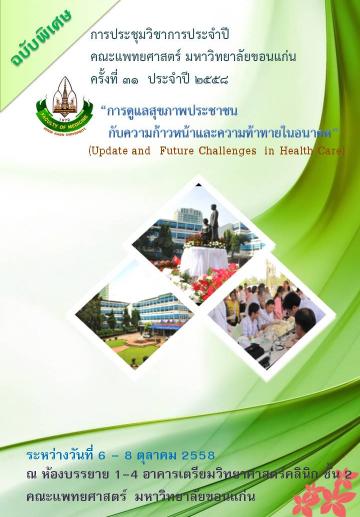Readiness for transition: Preliminary results of the preparation of adolescents with chronic kidney disease for transition to adult health care in a Tertiary care Hospital in North-Eastern Thailand
Keywords:
transition of health care, adolescent, chronic renal diseaseAbstract
Background and Objective : With the advance of medicine and therapeutic technology, a majority of children with chronic kidney disease survive and live longer lives beyond adolescence. At a certain age, adolescents will need to be transferred to the adult health care system, this is to promote self development and enable them to receive age appropriate care. Preparing adolescents for the transition will enhance their readiness before the actual transfer to the adult health care system occurs. We aim to assess the results of the preparation of readiness to transition in adolescents with chronic kidney disease, in which to date, there have not been any studies reported in Thailand.
Methods: This is a prospective study, subjects were adolescents age 12-18 years who were diagnosed with chronic renal disease or Systemic Lupus Erythematosus (SLE) and were attending the the pediatric nephrology clinic at Srinagarind hospital were invited to participate in the study. The researchers conducted a series of 3 skill enhancement groups, each group was held every 2-3 months which subjects were required to participate 3 times. Each group was conducted by 2 out of 3 health care professionals: an adolescent specialist, a psychologist and a pediatric resident. Demographic data and a self reported questionnaire about readiness to transition were collected from the adolescent subjects prior to and after participating in the groups. Parents or care giver were also asked to rate their adolescents’ level of readiness at the same time. Data was collected during September 10, 2014 – August 31, 2015. This study received approval from the Research Ethics Committee, Khon Kaen University and was funded by the division of finance for scholarship.
Results: There were 18 participants, 66.67% were female. The average age was 14.87 (12-17) years. Fifty five percent of the participants were diagnosed with chronic kidney disease and 44.44 % were diagnosed with SLE. The average time of since diagnosis was 4.5 (3-10) years. After participating in the first group, the subjects’ scores in regards to knowledge about disease increased 8%, self management increased 9%, making appointments and filling prescriptions decreased 2.3%, communication with health care team increased 42%, readiness for transition decreased 7% and social and daily routine increased 0.2% from their baseline scores. The relationship between participant’s age, duration of illness, level of education and family income to readiness for transition were not found to be statistically significant (P value= 0.37, 0.48, 0.49, 0.37 respectively)
Conclusion: Preparation of transition shows benefit to the participants, in this study. The participant’s age, duration of illness, level of education and family income were not found to be significantly related to readiness for transition. In order to evaluate the transition program, there should be ongoing studies with more participants and with longer follow up.




